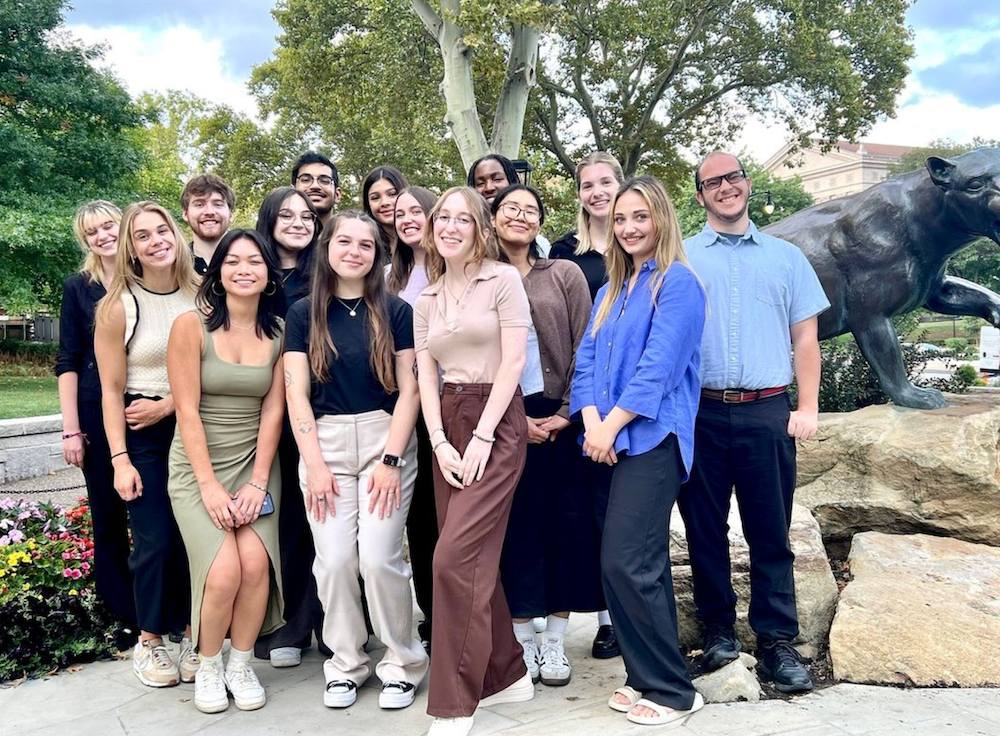“It doesn't matter what your major is, there's space for anyone with an interest in making an impact.” - Riya Lakhe (CGS '26) When Riya Lakhe transferred to Pitt in the fall of 2023, she worried about finding a program that would match her interests in both law and public policy. A sophomore Law, Criminal Justice, and Society major in Pitt’s College of General Studies (CGS), her advisors shared about two new offerings from the Graduate School of Public and International Affairs: an undergraduate public policy minor and the Policy and Social Impact Fellows Program. Riya credits Undergraduate Program Coordinator Jazmin Kent-Loera with confirming these programs were just what she was looking for, and she became one of the first two students to enroll in the public policy minor last spring. Now in her junior year, Riya is a member of the second cohort of Policy and Social Impact Fellows, further connecting her passion for criminal justice reform with a desire for practical, real-world experience and community impact.
When Riya Lakhe transferred to Pitt in the fall of 2023, she worried about finding a program that would match her interests in both law and public policy. A sophomore Law, Criminal Justice, and Society major in Pitt’s College of General Studies (CGS), her advisors shared about two new offerings from the Graduate School of Public and International Affairs: an undergraduate public policy minor and the Policy and Social Impact Fellows Program. Riya credits Undergraduate Program Coordinator Jazmin Kent-Loera with confirming these programs were just what she was looking for, and she became one of the first two students to enroll in the public policy minor last spring. Now in her junior year, Riya is a member of the second cohort of Policy and Social Impact Fellows, further connecting her passion for criminal justice reform with a desire for practical, real-world experience and community impact.
The Policy and Social Impact Fellows Program provides undergraduate students from all academic backgrounds an opportunity to engage in hands-on public service and policy work. Fellows use their diverse educational experience to address social issues and create positive change through collaboration and community-focused projects, leaving a lasting impact that reaches far beyond the classroom. Participating students receive a stipend of $2,250 for their participation in the program and earn an OCC Policy and Social Impact badge on completion.

Putting Theory into Practice
This year, Riya has worked on a project that aligns closely with her major in Law, Criminal Justice, and Society. Her fellowship includes collaborations with the Allegheny County Policing Project (ACPP) and the Police Data Accessibility Project (PDAP), organizations dedicated to increasing transparency and public understanding of policing systems both in the Pittsburgh region and across the U.S. The experience has “bridged the gap between theoretical knowledge and real-world issues,” she says, giving her a deeper understanding of how policy decisions shape public services and the impact day-to-day operations of these organizations have on the community.
One moment that stood out to Riya was attending the Allegheny Jail Oversight Board (JOB) meeting in December. The meeting brought board members, correctional officers, and community advocates together to discuss issues including correctional officer stress and inmate living conditions in the county jail and showed the challenges that come with meeting the needs of various stakeholders.
“Being there really humanized both sides of the system for me,” she said. “You have both the correctional officers working in a high-stress environment to provide for themselves and their families, as well as the inmates who are just people looking to serve their time and to re-enter society… it showed me the complexity of balancing public input with systemic priorities.”
Diverse Perspectives, a Common Goal
The Fellows Program thrives off its interdisciplinary approach, combining concepts from multiple fields of study for a well-rounded, deeper understanding of the issues. From pre-med students tackling healthcare sustainability to computer science students assisting with data collection, the variety of perspectives enriches the experience for each student and allows for a more comprehensive approach to the projects themselves.
“It’s been important to have a diverse network of knowledge,” Riya notes, “because the insights from other students help address stakeholder needs I wouldn’t have considered otherwise.”
Riya hopes to take the lessons she has learned in the Fellows Program into her future career. With aspirations to become a criminal defense attorney, she believes the program has provided her with valuable context about how justice systems operate in practice - not just in theory.
Her advice to undergraduate students interested in the Fellows Program is simple: don’t let your major hold you back.
“You don’t have to be in a public service-oriented field to contribute to the program,” she says. “All you need is a willingness to apply what you know to help your community.”
This year's Fellows will present their final projects at an event later this spring. Undergraduate students can learn more about the Policy and Social Impact Fellows Program here, or contact Undergraduate Programs Coordinator Jazmin Kent-Loera with any questions.